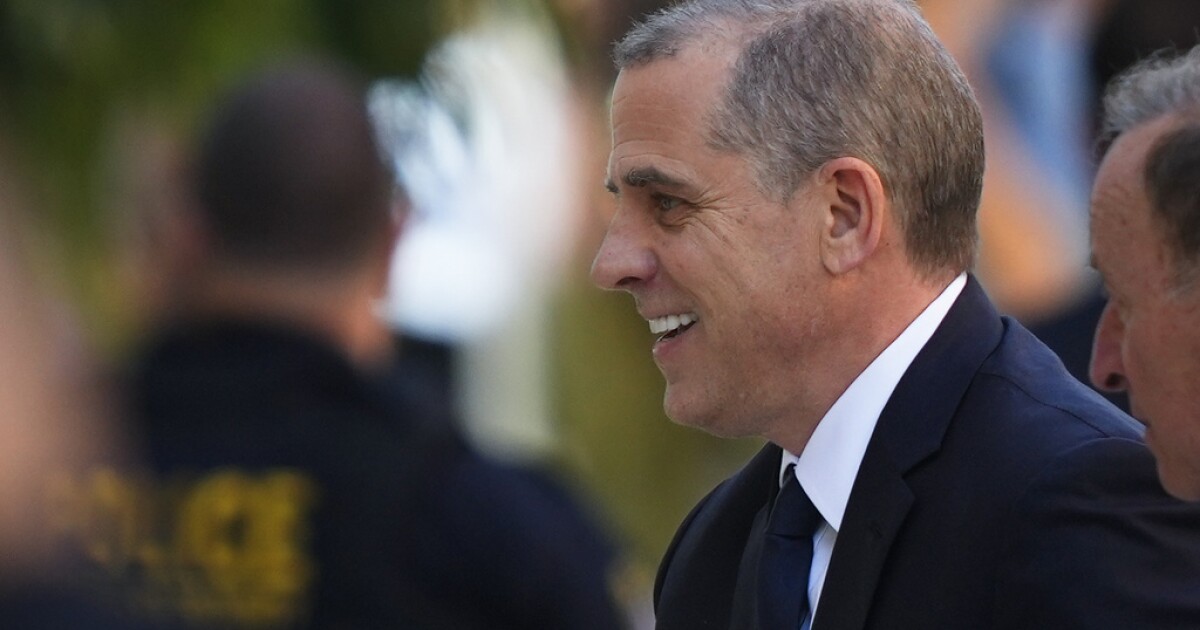

Hunter Biden is willing to fight his three felony firearm charges all the way to the Supreme Court if need be, as his lawyers vow that the “history and tradition” precedent for Second Amendment law is on his side.
Just before the younger Biden pleaded not guilty to a three-count indictment over alleged illegal possession of a firearm last month, his attorney Abbe Lowell vowed to use the Supreme Court’s 2022 New York Rifle & Pistol Assn. v. Bruen precedent. The ruling was vehemently condemned by his father, though his lawyer sees it as ammunition for his desired acquittal of the first son.
BIDEN ON THE BRINK: DEMOCRATS START TO PANIC ABOUT WHETHER THE PRESIDENT IS A SUREFIRE 2024 WINNER
“I want to make sure that everybody understands that after five years of an investigation, that the prosecutors knew all the facts, and the only change that has occurred between when they investigated and today is that the law changed,” Lowell said in September. “But the law didn’t change in favor of a prosecution; the law changed against it because a couple of federal courts have found this gun charge to be unconstitutional.”
Lowell was referencing the 2022 high court decision in Bruen that launched a new wave of scrutiny against gun control laws, as the precedent has led to the overturning of more than a dozen gun laws across various federal courts. The upshot of the legal test has essentially told federal judges to weigh historical evidence to determine whether a modern gun control law conforms with similar regulations as far back as the nation’s founding, leading to varying decisions among federal courts nationwide.
President Joe Biden himself said the 6-3 ruling led by Republican-appointed Justice Clarence Thomas “contradicts both common sense and the Constitution, and should deeply trouble us all.”
Now, it appears to be his son’s primary legal lifeline.
In February, a federal court in Oklahoma dismissed a case related to one of three charges Hunter Biden faces, 18 U.S.C. Section 922(g)(3), as “unconstitutionally vague” under the Bruen test. The language of the statute states anyone “who is an unlawful user of or addicted to any controlled substance” cannot legally purchase a firearm, as the currently sober first son has admitted in his memoir his addiction struggles with crack cocaine.
A three-judge panel for the U.S. Circuit Court of Appeals for the 5th Circuit ruled in August that the same subsection of the law is unconstitutional in U.S. v. Daniels, which involves a defendant who used marijuana while possessing a gun.
Even one of the most staunch anti-Biden and pro-gun lawmakers in the House, Rep. Matt Gaetz (R-FL), questioned, “Will we be cheering Hunter?” in a post on X, formerly known as Twitter, on the same day as Lowell’s remarks.
Legal experts like George Washington University law professor Jonathan Turley told the Washington Examiner it’s always possible Hunter Biden could be the namesake of a future Second Amendment challenge at the high court, though it is more likely that he could reap the benefit of a favorable ruling over existing legal challenges that are further down the line for the Supreme Court’s possible examination.
“A challenge to Section 922 would be predictable in most criminal cases,” Turley said. “This, however, would result in a curious challenge by Hunter of a law that has long been defended by his father. It could come to that, though cases like Daniels may do the heavy lifting in challenging the law.”
Firearms law experts and senior lawyer for the Firearms Policy Coalition, Cody Wisniewski, agreed that the first son might stand more to benefit from a favorable high court ruling in a different case like Daniels that’s more apt for Supreme Court consideration.
“The Daniels case has been decided by the 5th Circuit, so it’s already on its way up to the Supreme Court. More, the federal government lost to that case. And so anytime it’s the federal government, petitioning the Supreme Court for a writ of cert for review of their case, the likelihood that the [review] is granted goes way up,” Wisniewski said.
The federal government also lost in a separate 5th Circuit case known as U.S. v. Rahimi, which just had oral arguments at the Supreme Court on Nov. 10, with a ruling expected by summer. In short, the case surrounds a Texan drug dealer who is facing multiple criminal charges for egregious firearms violations but is asking the justices whether a noncriminal domestic violence restraining order should bar a firearm owner from possessing a gun under Section 922(g)(8).
“I think the Supreme Court is skeptical about Rahimi potentially because of the underlying facts of the case show that outside of this charge specifically, Rahimi has committed and been involved in other acts that would probably qualify him for disarmament under other parts of 922,” Wisniewski said.
“I think we’ll see where they come out on (g)(8), which is the provision that Rahimi was disarmed under,” Wisniewski said, adding depending on how broad or narrow the ruling is “will be key and the Rahimi decision.”
Counts one of special counsel David Weiss’s indictment alleges Hunter Biden lied on a federal Form 4473 about his drug use when he bought a Colt Cobra 38SPL revolver on Oct. 12, 2018, which he only held for 11 days. Count two alleges he knowingly made false statements to a federally licensed firearms dealer, and the third count is for possessing a gun “while knowing he was an unlawful” drug user.
If convicted of all three counts, he could face a maximum penalty of 25 years in prison.
CLICK HERE TO READ MORE FROM THE WASHINGTON EXAMINER
Hunter Biden’s attorneys are to submit any pretrial motions by a Dec. 11 deadline, and the government’s response is due by Jan. 16.
The Washington Examiner contacted Lowell for response.





